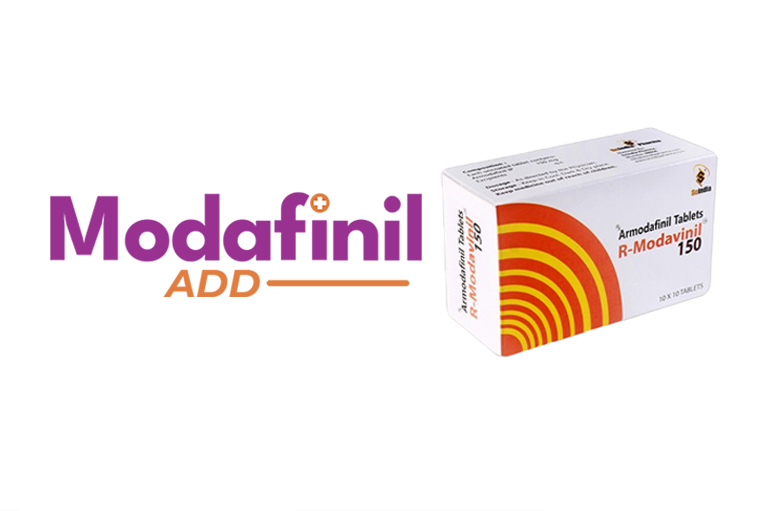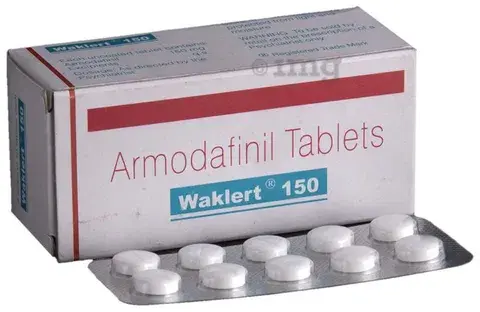Table of Contents
Armodafinil Side Effects: Everything you need to know
What is Armodafinil?
Armodafinil is a medication prescribed to treat excessive sleepiness associated with narcolepsy, sleep apnea, or shift work sleep disorder. It promotes wakefulness by affecting neurotransmitters in the brain. Commonly known as Nuvigil, it should be taken as directed by a healthcare professional to minimize potential side effects and risks.
What are the uses of Armodafinil?
Armodafinil lowers tiredness caused by narcolepsy and other sleep disorders, including obstructive sleep apnea. It can also help you stay awake during work hours if your schedule prevents you from sleeping normally (shift work sleep problem).This medicine is not a treatment for sleep problems and may not completely eliminate tiredness. Armodafinil is not a substitute for adequate sleep. It should not be used to treat weariness or prevent sleep in those who do not suffer from a sleep problem.It is unclear how armodafinil works to keep you awake. It is thought to work by affecting certain substances in the brain that control the sleep/wake cycle.
What Are the Most Common Side Effects of Armodafinil?
Armodafinil is closely related to the medication modafinil, which is also used to promote wakefulness and has a similar side effect profile.
For many people taking armodafinil, the benefits far outweigh the risks. Still, it is smart to know what you may experience after starting this stimulant medication. According to the armodafinil dosage recommendations, adults generally take between 150-250 mg daily. After going through deep research about armodafinil we have mention below some of the critical side of armodafinil:
Headache: A common side effect of armodafinil, often mild to moderate in intensity, may occur during initial use but tends to improve over time with continued treatment.
Dizziness: Some individuals may experience feelings of lightheadedness or unsteadiness, especially when standing up quickly or moving suddenly, which usually subsides as the body adjusts to the medication.
Difficulty Falling Asleep or Staying Asleep: Armodafinil may disrupt normal sleep patterns, leading to difficulties initiating or maintaining sleep; it’s advisable to take the medication in the morning to minimize sleep disturbances.
Difficulty Concentrating or Paying Attention: Occasionally, users may notice challenges in focusing or sustaining attention, which could affect cognitive performance, particularly at higher doses.
Uncontrollable Shaking: In some cases, individuals may experience tremors or involuntary shaking of a part of the body, typically mild and transient in nature.
Numbness, Burning, or Tingling: Sensations of numbness, burning, or tingling in the hands or feet may occur infrequently and are usually temporary.
Nausea and Vomiting: Some users may experience feelings of queasiness or discomfort in the stomach, occasionally leading to vomiting, particularly when the medication is taken on an empty stomach.
Heartburn and Stomach Pain: Gastrointestinal discomfort such as heartburn or stomach pain may occur, especially if armodafinil is taken without food.
Constipation and Diarrhea: Changes in bowel habits, including constipation or diarrhea, may occur in some individuals, typically resolving with continued use or adjustments in diet.
Loss of Appetite and Thirst: Armodafinil may suppress appetite and increase thirst in some users, leading to reduced food intake and increased fluid consumption.
Dry Mouth and Sweating: Dry mouth and excessive sweating are potential side effects of armodafinil, which may occur due to changes in neurotransmitter activity or autonomic nervous system function.
Frequent Urination: Some individuals may experience an increase in urinary frequency, possibly due to changes in fluid balance or renal function.
Rash, Blisters, Peeling Skin, and Mouth Sores: These can be signs of a serious allergic reaction and require immediate medical attention.
Hives and Itching: Allergic reactions such as hives or itching may occur, indicating an adverse response to the medication.
Swelling of the Eyes, Face, Lips, Tongue, Throat, Hands, Arms, Feet, Ankles, or Lower Legs: This could be a sign of a severe allergic reaction known as angioedema, requiring prompt medical intervention.
Hoarseness, Difficulty Breathing, or Swallowing: These symptoms suggest a potential throat or airway obstruction and require urgent medical evaluation.
Weakness, Chest Pain, and Irregular Heartbeat: These may indicate cardiac issues and require immediate medical attention.
Frenzied, Abnormally Excited Mood, and Hallucinations: Rare but serious psychiatric side effects that necessitate prompt medical evaluation and possibly discontinuation of the medication.
Anxiety, Depression, and Suicidal Thoughts: Changes in mood or the onset of depressive symptoms, including suicidal ideation, require immediate medical attention and evaluation.
Thinking About Killing or Harming Yourself: This is a serious potential side effect that requires immediate medical intervention.
Other Unusual Problems: While uncommon, armodafinil may cause additional adverse reactions; individuals should consult their healthcare provider if experiencing any unexpected or concerning symptoms while taking the medication.
These adverse reactions are usually mild. While headaches and stomach upset can be annoying, they often resolve over time as the body adjusts. Trouble sleeping may seem counterintuitive for a wakefulness agent. However, it can result from the longer half-life of armodafinil compared to other stimulants.
Staying hydrated, avoiding caffeine, and taking the medication early in the morning may help mitigate headaches and insomnia. An antacid or anti-nausea medication can relieve an upset stomach. If side effects remain bothersome, talk to your doctor about adjusting your armodafinil dosage or timing.

Also read our blog on: The 8 Best Nootropics & Smart Drugs That Actually Work
When Should You Call the Doctor About Side Effects of Armodafinil?
Most side effects of armodafinil are tolerable and tend to improve. But others may be signs of a serious problem requiring prompt medical care. Contact your doctor right away or seek emergency treatment if you experience:
- Skin rash, blistering, or mouth sores
- Irregular heartbeat
- Depression, aggression, hallucinations
- Easy bruising or unexplained bleeding
- Yellowing of the skin or eyes
- Difficulty breathing or swallowing
These could indicate a dangerous allergic reaction, liver issue, or mental health changes. Your doctor may advise you to stop taking armodafinil immediately. They can also determine if you need additional treatment or testing to address the concerning side effects.
Tips for Managing Side Effects of Armodafinil
- Take the lowest effective dose. Your doctor can work with you to find the ideal armodafinil dosage for your needs. Taking more than recommended increases side effects without added benefit.
- Use reminders. Set a daily alarm to remember your dose. Taking it late can lead to insomnia. Never double up doses if you forget.
- Stay hydrated. Drink plenty of water and non-caffeinated fluids. Dehydration exacerbates headaches and gastrointestinal issues.
- Limit caffeine. Avoid beverages with caffeine like coffee, tea, and sodas. Caffeine adds to the stimulant effects of armodafinil.
- Manage stress. Make time for relaxing activities. Stress can worsen side effects like anxiety, insomnia, and headaches.
- Eat healthy. Consume a balanced diet with fruits, veggies, lean proteins, and whole grains. Proper nutrition enhances your body’s ability to tolerate medications.
- Exercise. Engage in regular physical activity appropriate for your fitness level. Exercise helps manage stress and improves sleep.
- Communicate with your doctor. Report any persistent, intolerable, or concerning side effects. Your doctor may adjust the treatment plan to relieve troublesome symptoms.
What special precautions should I follow?
Precautions Before Taking Armodafinil
Before starting armodafinil, it’s essential to consider certain precautions to ensure safe usage and minimize potential risks.
Allergies and Inactive Ingredients
Discuss any allergies you have, particularly to armodafinil, modafinil, or any inactive ingredients present in the medication, with your doctor or pharmacist.
Medical History
Inform your healthcare provider about your medical history, especially if you have:
- Heart problems, such as an enlarged heart, mitral valve issues, chest pain, heart attack, or irregular heartbeat.
- Previous heart problems after using stimulant drugs like amphetamines.
- High blood pressure.
- Liver problems.
- Mental or mood disorders like depression, mania, or psychosis.
- Personal or family history of substance use disorders, including overuse or addiction to drugs or alcohol.
Driving and Alertness
Armodafinil is known to improve wakefulness, but it may not entirely restore your ability to react quickly, especially in individuals with sleep disorders.
- Avoid tasks requiring quick reactions, such as driving, until you are sure of your alertness level.
- Alcohol or marijuana consumption can increase dizziness, so it’s advisable to avoid them while taking armodafinil.
Surgical Considerations
Before undergoing surgery, inform your doctor or dentist about all medications you are taking, including prescription drugs, over-the-counter medications, and herbal supplements.
Pregnancy and Birth Control
- Notify your doctor if you are pregnant or planning to conceive. Pregnancy is not recommended while using armodafinil due to potential harm to the unborn baby.
- Discuss reliable non-hormonal birth control methods with your healthcare provider while using armodafinil and for two months after discontinuation. If pregnancy occurs, consult your doctor immediately to assess the risks and benefits of continuing the medication.
Conclusion about Armodafinil Side Effects
In conclusion, Armodafinil serves as an effective treatment for narcolepsy, obstructive sleep apnea, and shift work sleep disorder, aiding in wakefulness and productivity. While side effects such as headaches and gastrointestinal discomfort may occur, they are often manageable and diminish over time. However, serious reactions necessitate immediate medical attention. By adhering to precautions, communicating with healthcare providers, and maintaining a healthy lifestyle, individuals can maximize the benefits of Armodafinil while minimizing potential risks.
FAQs about Armodafinil Side Effects
We have mention each and everything about the armodafinil side effects, lets solve some of your questions in FAQs section.
What should I do if I forget a dose?
If you forget to take a dose of armodafinil, take it as soon as you remember, unless it is close to the time for your next scheduled dose. In that case, skip the missed dose and continue with your regular dosing schedule. Do not take a double dose to make up for a missed one. If you have any concerns or questions about missed doses, consult your healthcare provider for guidance.
What special dietary instructions should I follow?
While using Armodafinil, it’s generally recommended to follow a balanced and healthy diet. However, there are no specific dietary restrictions associated with Armodafinil use. It can be taken with or without food. Nonetheless, maintaining a nutritious diet rich in fruits, vegetables, whole grains, and lean proteins can support overall health and well-being while taking this medication. Avoiding excessive caffeine and stimulants is advisable to prevent potential interactions and to promote healthy sleep patterns. As always, it’s best to consult with your healthcare provider for personalized dietary advice based on your individual health needs and medical history.
How should this medicine be used?
Armodafinil is administered orally in tablet form. Typically, it is taken once daily.
- For narcolepsy or OSAHS treatment, take it in the morning.
- For shift work sleep disorder, take it one hour before your shift begins.
- Maintain a consistent daily intake time and consult your doctor before altering it.
- If your work shift varies, consult your doctor for appropriate timing.
Follow the prescription label carefully, and seek clarification from your doctor or pharmacist if needed. Adhere to the prescribed dosage precisely.
It’s important to note that armodafinil has potential for habit formation. Avoid exceeding the prescribed dose, frequency, or duration.
While armodafinil reduces sleepiness, it doesn’t cure sleep disorders. Even if you feel well-rested, continue taking it as directed by your doctor. Do not discontinue without consulting your doctor.
Armodafinil doesn’t substitute sufficient sleep. Adhere to your doctor’s recommendations for healthy sleep habits. Continue using prescribed breathing devices or treatments, especially for OSAHS.
Ask your pharmacist or doctor for the manufacturer’s patient information leaflet.
How to use Armodafinil?
To effectively use Armodafinil, consult the Medication Guide from your pharmacist before starting and with each refill. Direct any queries to your doctor or pharmacist.
For narcolepsy and obstructive sleep apnea, orally administer as prescribed by your doctor, usually once daily in the morning. For shift work sleep disorder, follow your doctor’s instructions, typically taking it once a day, one hour before your work shift. Armodafinil can be taken with or without food, but its efficacy may be delayed with food consumption.
Continue other sleep apnea treatments, such as CPAP machines or mouth devices, unless advised otherwise by your doctor.
Dosage is determined by your medical condition and response. Consistent use ensures maximum benefits.
What should I tell my care team before I take this medication?
They need to know if you have any of these conditions:
- bipolar disorder
- depression
- drug or alcohol abuse or addiction
- heart disease
- high blood pressure
- kidney disease
- liver disease
- schizophrenia
- suicidal thoughts, plans, or attempt; a previous suicide attempt by you or a family member
- an unusual or allergic reaction to armodafinil, modafinil, medicines, foods, dyes, or preservatives
- pregnant or trying to get pregnant
- breast-feeding
Where should I keep my medication?
Keep out of the reach of children.
Store at room temperature between 20 and 25 degrees C (68 and 77 degrees F). Throw away any unused medicine after the expiration date.
What is the armodafinil dose?
The usual armodafinil dosage for sleep disorders is as follows:
- 150 mg by mouth once a day in the morning for obstructive sleep apnea.
- 150-250 mg by mouth once a day in the morning for excessive sleepiness associated with narcolepsy.
- 150 mg by mouth once a day 1 hour before the work shift for shift work disorder.
Elderly patients may be started on a lower initial dose.
So this is all about the armodafinil side effects, however if you have any questions in your mind you can freely ask us in the comment section or contact us and our experts will be available for you 24/7.


